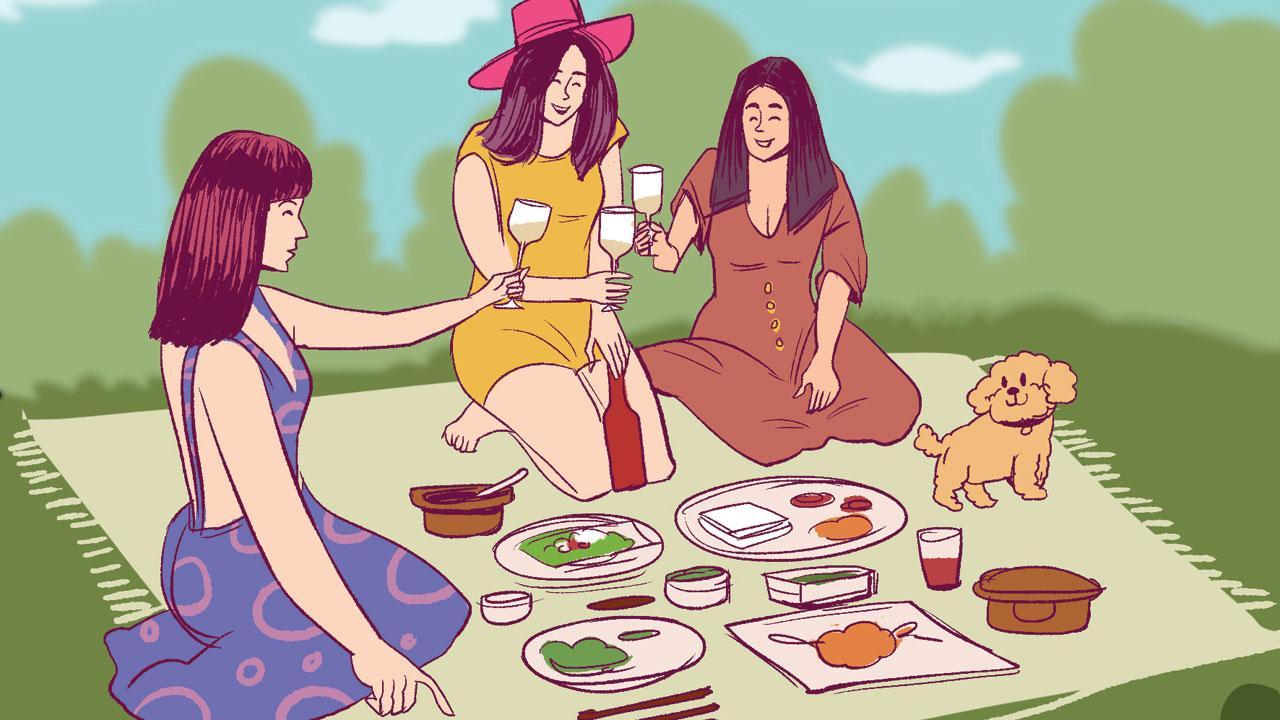After dinner, we might be treated to an orange bar from the ice-cream carts. An ordinary day became a moon-lit ditty

Illustration/Uday Mohite
![]() In the lockdown, I would often fantasise that one day, when it was all over, all the old friends I hadn’t met for so long and the new ones I’d made online, over shared recipes and writing challenges, would meet in one grand picnic. We would bring all the food we had posted pictures of and hug and eat and frolic in freedom, like Asterix and the village of Gauls celebrating victory over the Romans with a picnic dinner of wild boar.
In the lockdown, I would often fantasise that one day, when it was all over, all the old friends I hadn’t met for so long and the new ones I’d made online, over shared recipes and writing challenges, would meet in one grand picnic. We would bring all the food we had posted pictures of and hug and eat and frolic in freedom, like Asterix and the village of Gauls celebrating victory over the Romans with a picnic dinner of wild boar.
ADVERTISEMENT
School picnics were standard practice in my childhood. My parents, otherwise not much into parenting, took great interest in turning my picnic box into a miniature spread, a lucky dip of finger foods. It always included devilled eggs and tiny homemade mince patties and sandwiches, all foods that still occupy Enid Blyton status in my head.
Picnics could also be spontaneous and less elaborate. It was common, while growing up with cousins in old Delhi, to pack up our rajma chawal dinners, pressure cooker and all, to picnic on India Gate lawns, like many other families. After dinner, we might be treated to an orange bar from the ice cream carts. An ordinary day became a moon-lit ditty.
In Bombay, the beach on many evenings is a spread of family picnics like this. Part of what comforts me about picnics is this inclusive nature. One can picnic even with modest means. It’s a utopian glimpse of togetherness in difference that public spaces can provide, where disparities are not so definitive. Like a song in a Hindi film, a picnic is a double meaning. For some, it’s a break that accepts everyday routine as the default. Such disciplined folks, may give you reality checks, saying “life is no picnic, ok?” Other incorrigibles sneak picnic-ness into the everyday bit by bit until all life is picnic.
Hindi films would often feature picnic songs, hinting at some of this. Young people in fashionable clothes would run off, bearing guitars, to flower-filled gardens. The hero and heroine would occupy centre stage in a circle of dancers, replicating the raas leela of Radha and Krishna in songs about rising desire. Away from the world of social convention, leisure and pleasure ruled. Many picnic songs featured same-sex amorousness, especially between women, under the pretext of romantic role play.
My first lockdown outing was in fact a little picnic. My friend Bela and I met in Aarey colony. She brought apple cake and her dog (not to eat, just to walk). I brought paniyarams and coffee. We found a tree to shelter us from the drizzle. And in the velvetty monsoon green, we ate our picnic breakfast, savouring company with each bite, so missed for so long.
All things come to those who believe. Last week I was in Delhi. It is spring time. The city’s fabulous public parks are jolly with tulips and shameless with roses. We celebrated my friend Samina’s birthday with a picnic. We brought sandwiches. Afghani chicken came by WeFast. A friend made a fairytale cake. There were grown-ups and kids, and grown-ups climbing trees like kids. We glowed in the sun, we laughed, we ate, like other groups around us. Rolled up dhurries in hand, we walked back thinking it is easy to feel replete with just a little sometimes. We did not sing a song. Perhaps we were, ourselves, just for a bit, a song.
Paromita Vohra is an award-winning Mumbai-based filmmaker, writer and curator working with fiction and non-fiction. Reach her at [email protected]
 Subscribe today by clicking the link and stay updated with the latest news!" Click here!
Subscribe today by clicking the link and stay updated with the latest news!" Click here!







